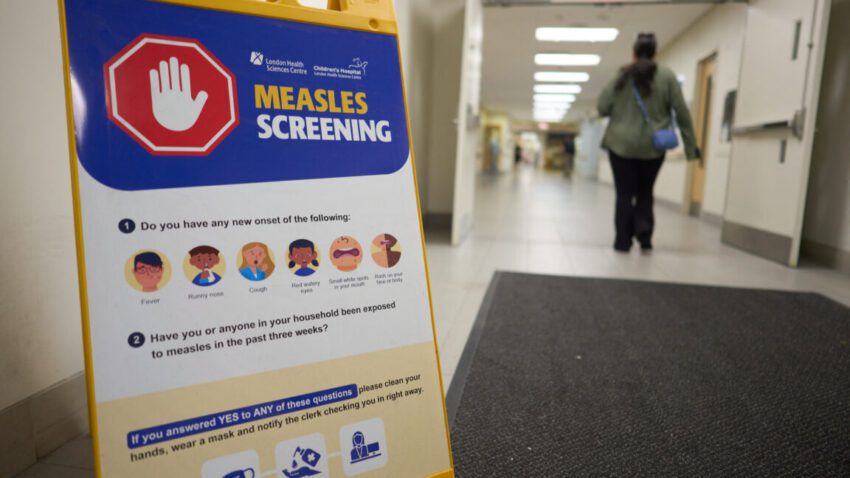
canada fought measles and measles won virus Canada has lost its measles elimination status, meaning the highly infectious virus is considered endemic once again in the country, The Pan American Health Organization (PAHO) announced Monday.
canada fought measles and measles won virus
Background on Measles Elimination
Measles is a highly contagious viral disease that can lead to severe health complications, including pneumonia, encephalitis, and even death. The virus spreads through respiratory droplets when an infected person coughs or sneezes. Prior to the widespread availability of the measles vaccine, the disease was common worldwide, leading to significant morbidity and mortality.
In Canada, the introduction of the measles vaccine in the 1960s significantly reduced the incidence of the disease. By 1998, Canada achieved its measles elimination status, which meant that the country had not experienced any continuous local transmission of the virus for 12 months. This milestone was celebrated as a significant public health achievement, reflecting the effectiveness of vaccination programs and public health initiatives aimed at controlling infectious diseases.
Recent Developments
The recent announcement by PAHO marks a significant setback for Canada’s public health efforts. The determination was made by a committee of PAHO experts who analyzed disease data from various countries in the Americas. Their findings revealed that Canada is currently the only country in the region where measles is considered to be spreading endemically.
This change in status is particularly concerning given that the Americas had achieved measles elimination in 2016. The loss of this status not only affects Canada but also has implications for the entire region. Other countries, including the United States and Mexico, are also facing challenges in controlling measles outbreaks, raising fears that they may soon follow Canada’s path.
Understanding Endemicity
Measles is classified as eliminated when a country can go 12 months without continuous local spread of the virus. However, sporadic cases can still occur, often brought in by international travelers. These imported cases can lead to limited outbreaks, but elimination status is lost when sustained transmission occurs over the course of a year.
The recent data indicates that Canada has not only seen sporadic cases but has also experienced sustained local transmission of the virus. This situation is alarming, as it suggests a failure to maintain high vaccination coverage, which is essential for herd immunity. Herd immunity occurs when a significant portion of a population is vaccinated, thereby providing indirect protection to those who are not immune.
Vaccination Rates and Public Health Implications
The decline in measles elimination status can be attributed to various factors, including a decrease in vaccination rates. Public health experts have noted that vaccination coverage in Canada has fallen below the levels required to maintain herd immunity. According to the World Health Organization (WHO), at least 95% of the population needs to be vaccinated to effectively prevent outbreaks of measles.
Several factors contribute to declining vaccination rates, including vaccine hesitancy, misinformation about vaccine safety, and logistical challenges in accessing healthcare services. The COVID-19 pandemic has further complicated vaccination efforts, as many routine immunization programs were disrupted or delayed.
Vaccine Hesitancy
Vaccine hesitancy refers to the reluctance or refusal to vaccinate despite the availability of vaccines. This phenomenon has been fueled by misinformation spread through social media and other platforms, leading some parents to question the safety and necessity of vaccines. Public health campaigns aimed at addressing these concerns have become increasingly important in combating vaccine hesitancy.
Logistical Challenges
In addition to vaccine hesitancy, logistical challenges in accessing healthcare services can also impact vaccination rates. In remote or underserved areas, families may face difficulties in obtaining vaccines due to a lack of healthcare facilities or transportation. Addressing these barriers is crucial for ensuring that all populations have access to vaccines and can contribute to herd immunity.
Global Context and Regional Implications
The loss of measles elimination status in Canada is not an isolated incident; it reflects a broader trend observed in various countries around the world. The World Health Organization has reported a resurgence of measles cases globally, with significant outbreaks occurring in regions that had previously achieved elimination status. Factors contributing to these outbreaks include declining vaccination rates, increased international travel, and the spread of misinformation about vaccines.
In the Americas, the situation is particularly concerning. While Canada is currently the only country with endemic measles, the United States and Mexico are experiencing rising cases. In 2019, the U.S. reported its highest number of measles cases in nearly 30 years, prompting public health officials to issue warnings about the potential for further outbreaks. The interconnectedness of countries in the region means that the resurgence of measles in one country can have ripple effects on neighboring nations.
Stakeholder Reactions
The announcement of Canada’s loss of measles elimination status has prompted reactions from various stakeholders, including public health officials, healthcare providers, and advocacy groups. Many have expressed concern about the implications for public health and the need for renewed efforts to increase vaccination coverage.
Public Health Officials
Public health officials have emphasized the importance of vaccination as the most effective way to prevent measles outbreaks. They are calling for increased public awareness campaigns to educate communities about the safety and efficacy of vaccines. Additionally, officials are advocating for policies that support vaccination, such as school entry requirements and access to vaccines in underserved areas.
Healthcare Providers
Healthcare providers play a critical role in addressing vaccine hesitancy and ensuring that patients receive the necessary vaccinations. Many healthcare professionals are working to build trust with patients and provide accurate information about vaccines. They are also advocating for the importance of routine immunizations, particularly for children, who are most vulnerable to measles.
Advocacy Groups
Advocacy groups focused on public health and vaccination are mobilizing to address the challenges posed by declining vaccination rates. These organizations are working to counter misinformation and promote the benefits of vaccination through community engagement and outreach efforts. They are also collaborating with public health agencies to develop strategies for improving vaccination coverage.
Conclusion
The recent announcement by PAHO regarding Canada’s loss of measles elimination status serves as a stark reminder of the ongoing challenges in controlling infectious diseases. As measles is now considered endemic in Canada, it underscores the urgent need for renewed efforts to increase vaccination rates and address the factors contributing to vaccine hesitancy.
Maintaining high vaccination coverage is essential not only for protecting individual health but also for safeguarding public health at large. The interconnected nature of global health means that the resurgence of measles in one country can have far-reaching implications for others. As Canada navigates this setback, it is crucial for public health officials, healthcare providers, and communities to work together to restore the country’s measles elimination status and protect future generations from this preventable disease.
Source: Original report
Was this helpful?
Last Modified: November 11, 2025 at 6:37 am
3 views















